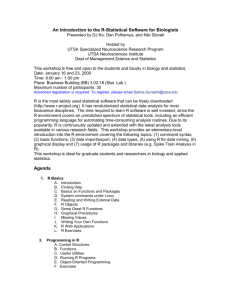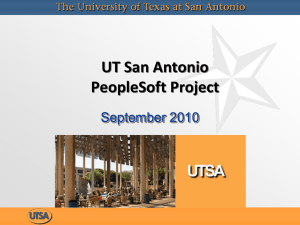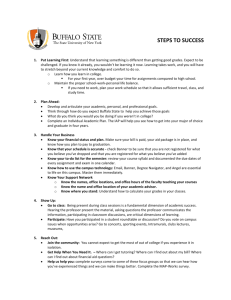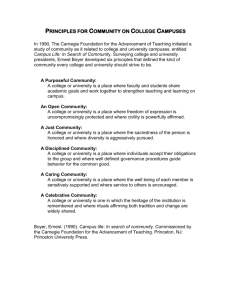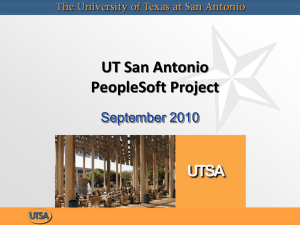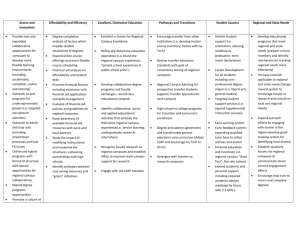UT System ERP Planning Project Financial Area Representatives
advertisement
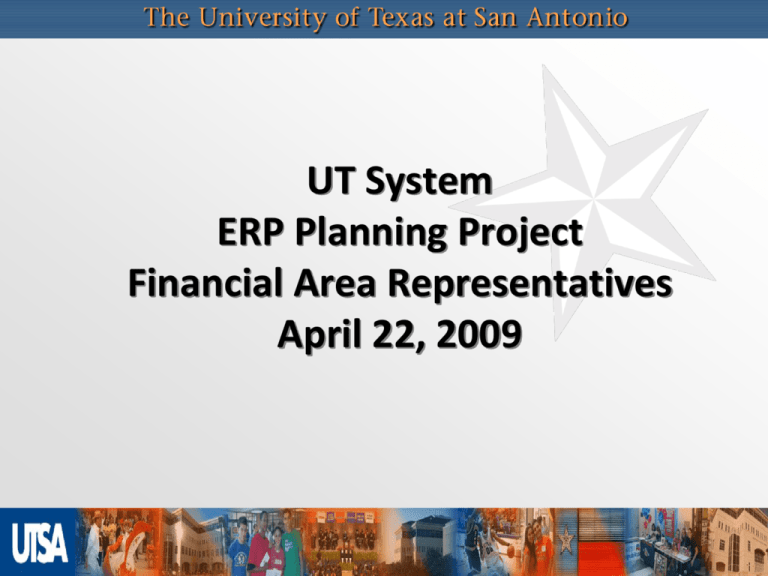
UT System ERP Planning Project Financial Area Representatives April 22, 2009 UTSA’s ERP Environment UTSA uses UT Austin’s DEFINE system for HR & Financial applications IBM Mainframe-based Flat file – not a relational data base Partially web enabled Highly customized Highly automated campus workflow Not a comprehensive HR system DEFINE is inexpensive – less than $400,000 per year for access & maintenance Does not include UTSA IT or DEFINE administrative staff 1 UTSA’s ERP Environment DEFINE functionality is controlled by UT Austin Major overhaul to HRMS system in progress No shared governance or service level agreement Some system enhancements / changes are not always shared 2 UTSA’s ERP Environment Banner Student is our system of record for all revenue, scholarship and financial aid awards and other important student information. No integration with the DEFINE financial system Custom interface between Banner & DEFINE required to create financial system records Currently, reconciliation is manual 3 TEXSIS Project TEXSIS Project is a pilot for a shared service implementation of the Campus Solutions (Student Administration application) by UT Dallas UT Tyler UT Arlington Funded by Board of Regents in 2006 using Permanent University Funds (PUF) Staggered implementation – “go live” during 2009 4 TEXSIS Project Goals & Objectives Improve and streamline business processes Implement IT system using higher education best practices Shared governance project model for implementation & ongoing maintenance Minimize software modifications Share best & common practices amongst institutions Pursue value added new initiatives 5 UT System ERP Planning Project Following success of the TEXSIS project, UT System contracted for a cost analysis and feasibility for a similar project for Finance & HR. UT Dallas is using a very old software package (SCT+) for Finance and Human Resources (Payroll) that will no longer be supported by the vendor. UT Dallas must do something now to protect its administrative computing viability 6 UT System ERP Planning Project UTSA participated in a survey regarding campus requirements and readiness to implement an Enterprise Resource Planning (ERP) system Collaborative effort with OIT, HR & Financial Affairs Alvarez & Marsal (consultant team) analyzed & issued a report in December 2008 7 Survey Findings Most campuses (other than Dallas) are not ready for a major system implementation project Dallas has no choice Other campuses may want to migrate from DEFINE but are not prepared No funding for a major project Inadequate staffing to take on additional workload Insufficient IT staff for ongoing maintenance and support 8 Survey Findings Consultant recommended PeopleSoft to meet the campus’s major functionality requirements Not many choices – SCT Banner, Oracle, Datatel, SAP TEXSIS is using PeopleSoft, so they will have an integrated software suite & experience with PeopleTools, as well as the physical environment (data center at UT Arlington) Shared implementation costs result in overall savings Will require a great deal of cooperation between participating campuses 9 Estimated Project Costs PUF funds are currently not available to support project implementation UT System will cover software maintenance & 2 staff for project management Project implementation costs estimated for consultants, backfill and travel: $9M per campus if 8 campuses participate $10M per campus if 5 campuses participate $15M+ if campus goes it alone No estimates for ongoing costs 10 Project Constraints, Issues & Concerns Implementation must be ‘vanilla’ to reduce project costs DEFINE is highly customized We will lose some functionality and gain other One single software instance Adds project risk Different from TEXSIS project where each campus has their own instance of the software (more costly, but more flexible) All campuses must apply fixes, patches and upgrades at the same time & perform system maintenance on the same schedule Business system interruption vulnerability – no redundancy 11 Project Constraints, Issues & Concerns Implementation is based on a ‘big bang’ approach – everything at the same time This is very difficult We would recommend phasing if / when UTSA moves off of DEFINE HR first – including Payroll, interface labor costs to DEFINE Finance immediately following 12 UT System Proposal As a result of most campuses’ reluctance to commit, the following was proposed by the UT System: Let UT Dallas plan for an implementation starting Fall 09 Set up shared governance structure on the basis of a “soft commitment” of the other campuses to follow with an implementation when ready, within 3 years 13 UT System Proposal Participation in shared governance will cost UTSA about $50,000/year Some risk to this approach – Software versions will change due to vendor support schedule Timing of our implementation must be carefully considered – we don’t want to ‘go live’, only to have to upgrade shortly thereafter All decisions about software functionality and system usage will be determined and set with limited opportunity to revise Will require us to stay very involved with UT Dallas implementation 14 UT System Proposal Some benefits to this approach – UT Dallas will be ‘proof of concept’ We can be involved without the immediate pain We can take the time to evaluate other options We can begin making business process improvements We can plan for financial, staffing and other requirements to position us for a major ERP implementation and change initiative. We will have a CIO on board to assist with the transition. 15 Opportunities to Explore Conduct a comparative study of the costs and benefits of implementing SCT Banner HR & Finance Benefits: Leverage what we have / know Physical integration of student financial data with financial application We control the environment, release/fix upgrade schedule, functionality and degree of customization Phased in approach at our pace, with our project plan and control Possible collaboration with other UT campuses using Banner Student Costs: UT System does not support this direction We would bear the full cost of hardware, IT support, maintenance, and software application 16 Opportunities to Explore Evaluate the feasibility / desirability of collaboration with UTHSCSA – they have a mature, full functionality PeopleSoft system. Begin funding/financial planning for a future ERP implementation Evaluate business process changes, improvements and staffing/backfill requirements CIO Involvement is critical 17 CMO Recommendation CMO recommended that we opt to participate but explore other opportunities Will require commitment of UTSA staff time to validate UT Dallas pilot project decisions Project structure for our involvement will be discussed in the coming weeks with affected areas and staff 18
